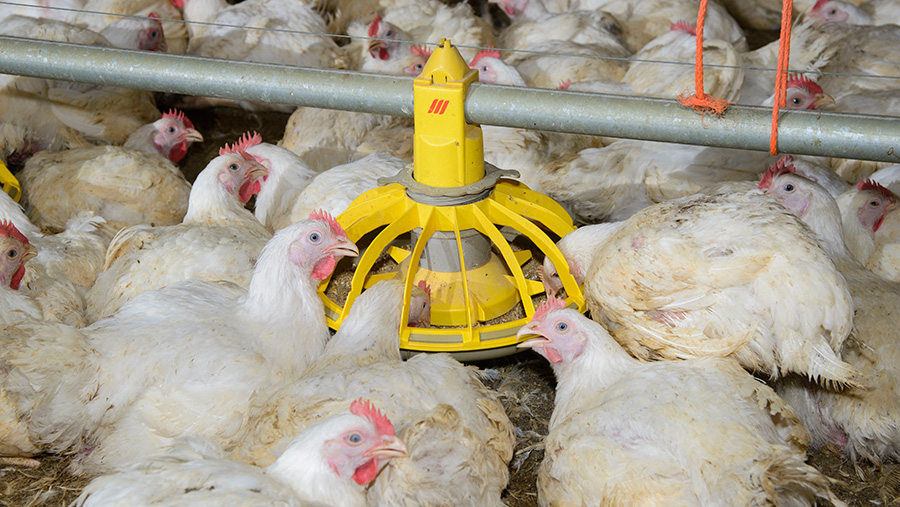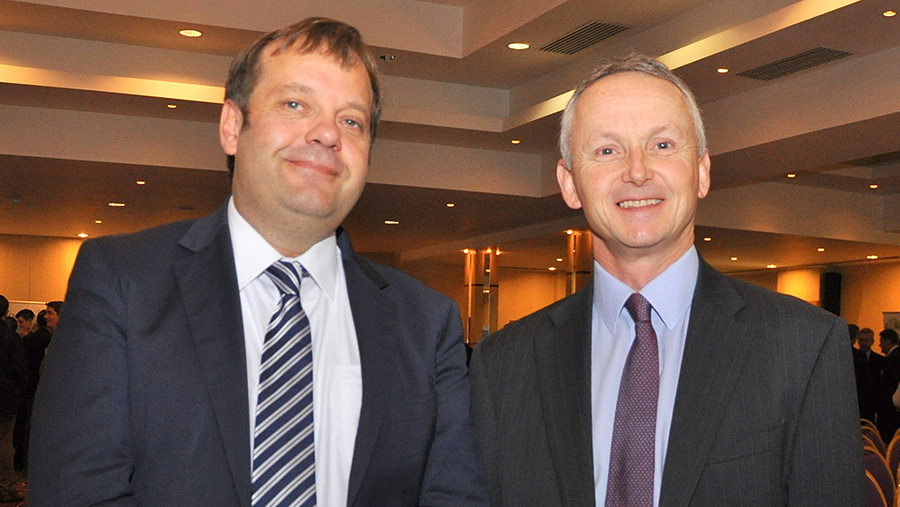Poultry disease and technology top conference agenda
 © FLPA/John Eveson/REX/Shutterstock
© FLPA/John Eveson/REX/Shutterstock Remaining vigilant to disease in the poultry industry and adopting the latest technologies were two keys points discussed at a major poultry conference in the Republic of Ireland on 9 November.
Organised by Bord Bia, the state agency in Ireland that promotes food, the conference attracted about 200 delegates from the poultry and egg sector.
Speakers at the event in the Hillgrove Hotel touched on all aspects of production as well as a look at how the industry is performing worldwide.
The theme for this year’s conference, which takes place every two years, was “Innovation Supporting Sustainability.”
See also: Reducing antibiotics in poultry farming
It was fitting the event was held in Monaghan as the county is home to three of the Republic’s seven Bord Bia Quality Assured slaughter plants for poultrymeat.
Local economy benefits
Ireland’s minister of state for food, forestry and horticulture, Andrew Doyle, opened the conference highlighting the importance of the sector to the local economy.
The minister said: “Poultry and eggs is an important sector within the Irish agricultural economy accounting for approximately 3% of the gross agricultural output and proudly supports about 6,000 jobs, most of these in rural areas.
“Output at producer prices in 2015, amounted to €190m [£163m] and the value of poultrymeat exports amounted to €320m [£275m].
On the back of increasing demand for poultry protein and low feed costs, the outlook for the sector is positive for the remainder of 2016 and into next year.
There are challenges, of course, not lease the impact of the decision by the UK to exit the EU.
“Bord Bia estimates that over 90% of poultrymeat produced on the island of Ireland and 95% of all eggs consumed in Ireland are Quality Assured and the inherent value this gives to the product does not escape the consumer.
The competitive advantage
“In terms of challenges for our agri-food sector, the UK Brexit referendum is obviously foremost in our minds, too, and in government it is very much our number one priority.
“It is essential we retain our national competitiveness as much as we possibly can while mitigating the effects of a possible disruptive exit by Britain from the EU.
“The effects on our agri-food sector are already been felt by exporters hugely affected by the weakening sterling rate against the euro lately.
“I am listening closely to what exporters have to say, and Minister Creed is chairing a meeting of a stakeholder forum for the agri-food sector specifically focus on Brexit-related issues.
“This will continue to be our priority in the immediate future and there will be further announcements on help which we may be able to offer on mitigating the negative effects of a British exit from the EU.”
Research has shown that 99.5% of shoppers In Ireland buy poultry and egg products and only 20% of them are willing to pay more than 35c (30p) for an egg.
It was also noted half of the shoppers would not spend more than €16/kg (£14) on poultrymeat.
In terms of global markets, avian influenza really shook up the poultry and egg markets in 2015, according to Rabobank’s Nan-Dirk Mulder.
Mr Mulder said the disease had moved across from Asia as far as western Africa and into America as well as numerous outbreaks in central European regions.
China prospects
Looking forward the Rabobank expert said China was the big “swing factor” in 2016 and will be in 2017.
“China is a key market in the future,” he said. “Although their production and consumption are quite high, they currently balance out each other. Therefore imports and exports have been very low.
“This will change in the next few years as there is a delay in the breeding stock cycle in China. Once more birds become productive this trend will change and China will be back on the market in force.
“It definitely is the country to aim for if you want to sell poultry in the years to come,” he added.
Mr Mulder went on to say that demand is increasing for slower growing poultry in the future and that the Nordic countries are growing the fastest in terms of general poultry production.
Of course he mentioned Brexit and said: “The UK is the biggest net importer of poultrymeat in the EU.
“The main concerns for Ireland and other EU countries are trade barriers and how these, if implemented, would affect their trade with the UK.
“South Africa and Ukraine are becoming major exporters of poultry into the EU also and this is another major factor in terms of the EU industry in the next few years.”
The UK egg industry is 85% self-sufficient in its production of eggs producing 34 million eggs on a daily basis.
Egg consumption in the UK increased in 2015 by eight eggs per person per year to 191.
The demand for cage-free
Mark Williams, chief executive of the British Egg Industry Council (BEIC) focused on new demands for cage free poultry and how Brexit will bring challenges and opportunities for the UK industry.
Mr Williams said: “About 35-40% of the staff on egg farms are migrant labour.
This increases to 55-60% in the packing industry.
“Brexit has brought our sector a bonus in that it has pushed the price of imports up allowing us to use more of our own production, but in turn the price of feed has also gone up as it has to be imported too.
“One of the major concerns is if the government will seek to protect our high standards in future trade negotiations, or will it be free trade?
“Concerns for Irish poultry farmers is whether there will be a border between the Republic and Northern Ireland.
“I do hope for a soft Brexit and I think there will be concessions in terms of free movement of people during the negotiations.”

Conference speakers: Rabobank’s Nan-Dirk Mulder and the British Egg Industry Council’s Mark Williams
Poultry housing
Perhaps the most interesting topic of the conference surrounded technology for poultry housing.
Well-known poultry farmer and consultant, David Speller, farms 180,000 broilers on his own farm in Derbyshire plus contract manages 10 other global sites with 3 million birds producing 20 million birds a year.
Mr Speller is an advocate of new technologies and has installed numerous examples of advanced kit on his farm.
He said while there is a concern technology is being developed quicker than farmers can understand it, there is room for good technology that can improve the margins of a flock.
In the past six years, Mr Speller has invested £2.5m on new technologies and says he benefits to the tune of £35,000-£40,000/year from this.
Recruitment dilemma
He said: “Recruiting staff these days is a huge problem. We can get good staff that are good with animals but are poor with technology. Some farm managers these days don’t even have cameras on their telephones.
“We need to become more involved with immersive technology and robots with mobile sensors. Other things such as electronic water regulators would be a huge benefit. Plus, I would like to see more autonomous computer control of sheds too,” he said.
However, the adoption of new technology can bring with it some challenges.
Mr Speller said: “Initial capital outlay is a major factor, as is the recruitment of staff who see the vision. Staff that are good with animals normally means poor with technology.
“Some of the new equipment cannot stand up to the demands of high-pressure cleaning and harsh detergents and disinfectants in the houses.
“Another major challenge is poor internet speeds on farm and the cost of continual development of technology,” he added.
